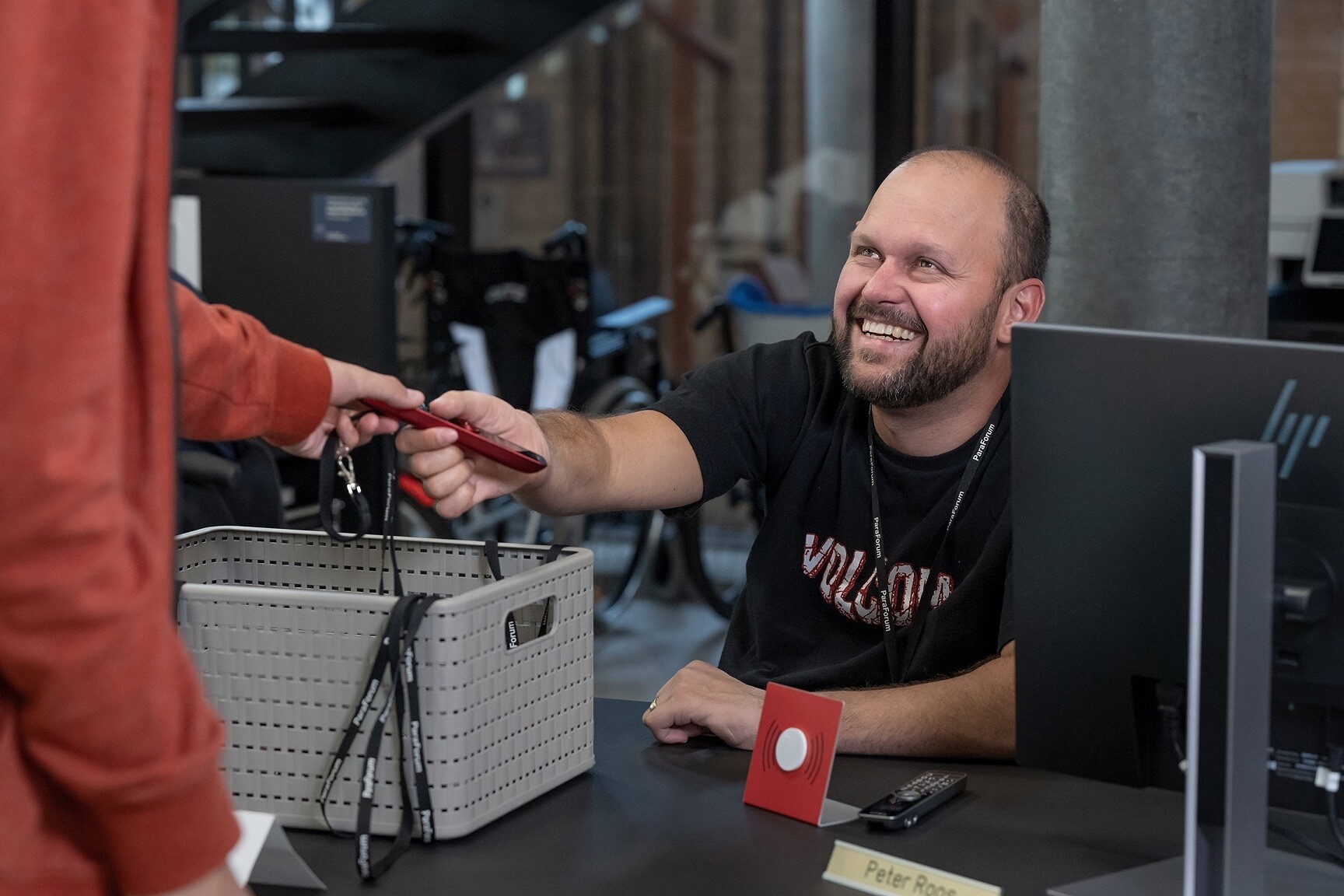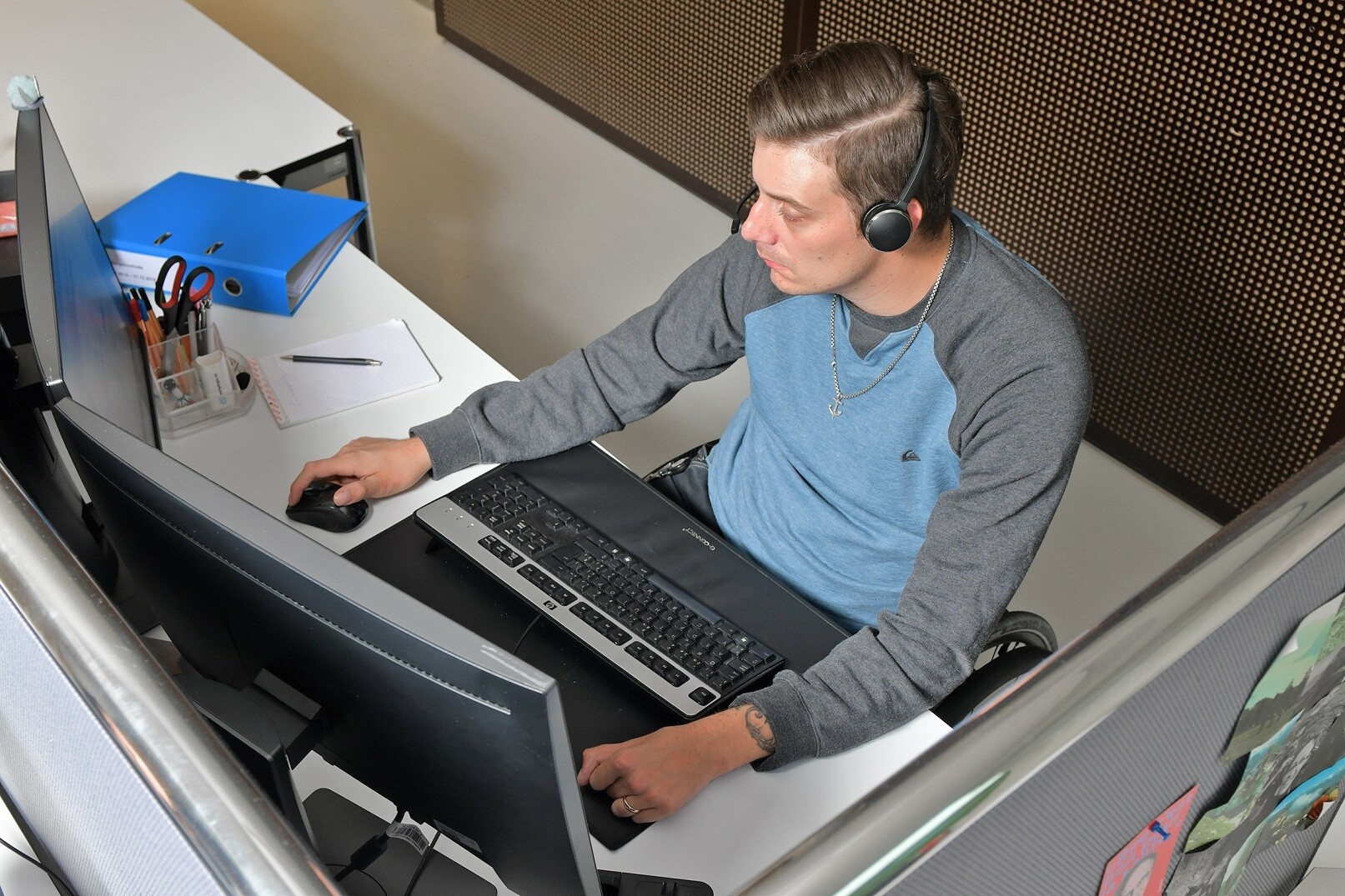Three persons affected tell how they got to know SPC as patients - and why they work there today
- 5 minutes to read
- 14 December 2022
- Christine Zwygart
Three persons affected tell how they got to know SPC as patients - and why they work there today
One who suddenly depends on a wheelchair due to an accident or illness goes through a life changing time. Rehabilitation is challenging and perspectives change enormously. Oftentimes, the current job becomes no longer doable and career aspirations can no longer be realized. Many affected people are forced to change their vocational direction.
The Swiss Paraplegic Group has a total of 2,074 employees – some of them are wheelchair users. Three people who have completed their rehabilitation in Nottwil speak about their reasons for choosing to also work there now.
Peter Roos provides insights to visitors
At the Visitor Centre ParaForum in Nottwil, everyone who is interested can learn about life with a spinal cord injury. The team consists of seven people, four of whom are wheelchair users – including Peter Roos. Whether disabled or not, “we are all treated the same way here,” emphasizes the 38-year-old. The tetraplegic knows, however, that his colleagues are very understanding when he deals with health complications or personal indispositions. “No lengthy explanations are necessary, everyone is considerate.”

Explaining and telling: Peter Roos guides visitors through the clinic in Nottwil and provides insight into his life as quadriplegic.
He was a mason, had completed his overseer training and wanted to do further training to become foreman and supervisor. But before that, he went on a trip through the USA and there, in Florida, the accident happened eleven years ago: Peter dove into the pool, hit the floor and broke two cervical vertebrae. Weeks later her gained consciousness at Swiss Paraplegic Centre (SPC), “here they took care of me.”
Returning to work was difficult for the young man: “Whenever I saw a construction site, my eyes filled with tears.” A challenging phase followed: With a diploma in trades Peter Roos returned to the trades, completed further education for technical merchant, did field service for Coloplast and became event manager. “And as a freelancer I gave tours at SPC.” He had always been immensely grateful that this centre existed – for everything that was done for him here.
“It is a great pleasure being an ambassador for SPC – this allows me to give back.”
Peter Roos
When the newly established ParaForum looked for employees in the summer of 2019, I put in my application. “For us, the conditions are like in paradise here: There is disabled parking in the dry, everything is wheelchair accessible and perfectly adapted for our needs.” Long since SPC has become his home away from home which the family father also likes to visit with his children to go to the pool. Peter provides insights into his family life in a wheelchair on Instagram.

Peter Roos works at the Visitor Centre ParaForum and takes care of the guests.
No commute is too far for Karin Schmutz
Also Karin Schmutz knows this feeling of gratefulness. The 42-year-old works for Member Marketing of the Swiss Paraplegic Group, is a pedestrian and commutes from Lake Thun to Nottwil. To do so, she accepts a commute of one and a half hours – one-way. “It has always been my wish to get involved,” she explains.
“The memories of my rehab are with me every day, every hour. I am happy and grateful to also work here now.”
Karin Schmutz
She was 18 years old, a high school student and on a cave exploration trip in France. That’s when Karin went off the trail at the campground and fell 10 m down. The emergency surgery was done at a regional hospital, rehabilitation followed in Nottwil. “A complete paraplegia was diagnosed, after the accident, my muscle status showed only zero values below the fracture.” When she thinks back to the seven months she spent in the clinic, more than anything else she remembers the loving and professional care.

Her understanding for persons with spinal cord injury is based on her own experience: Karin Schmutz works in the Marketing Department today.
Despite the little optimistic diagnosis she tried to move her big toe night after night. For a long time in vain. But suddenly there was a twitch. “From this moment on, I strongly believed that I would be able to walk again one day.”
With therapies and patience, Karin Schmutz worked hard to be able to walk again. She studied business administration, lived abroad for a long time, met her husband and became a mom. “And there was always this longing to return to Nottwil.” Her understanding for the situation of the people affected is anchored inside her. She now puts her knowledge and skills at the service of people with spinal cord injury.
Florian Bickel can be asked about anything
That’s what also Florian Bickel does. The quadriplegic has worked in Nottwil for 10 years, first in Marketing and then for ParaForum since 2019. “I feel taken seriously as employee which is good for the self-esteem,” explains the 36-year-old.
Since he broke two cervical vertebrae during a snowboard accident in 2008, he wants to educate and inform people about how life with a spinal cord injury works. “Because I don’t want anyone to feel uncomfortable or hesitant in my presence.” What helps is talking, talking, talking. And asking! “I like it when visitors want to learn a lot. Because I like to give information – about anything.”

Organizing guided tours and doing administrative work is part of the Florian Bickel’s job at the Visitor Centre.
Florian used to be a carpenter, then had planned to take some time off to go to Australia with his twin sister – but the accident ruined his plans. While he was still in the intensive care unit in Nottwil, the team for professional counselling introduced themselves; eventually he decided to go to business school. Before long he thought about working for the Centre. “I have always felt comfortable, understood and above all safe here.”
«Here I am able to use the entire infrastructure, attend appointments at physio, dentist or hairdresser.”
Florian Bickel

Florian Bickel has been working for the Swiss Paraplegic Group for ten years and feels safe here.
By the way: The first time Florian was in Nottwil was when he was young and still able to walk during recruitment at the neighbouring military hospital. He still remembers well, “when they saw the wheelchair users in the clinic during dinner.” Karin Schmutz, on the other hand, has not had any personal experience at the SPC before her rehab. Peter Roos often whizzed by the SPC on his road bike until he stopped there for a junior citizen celebration for the first time – as a pedestrian and patron, “because a friend from school had suffered a spinal cord injury during an accident.”
Florian, Karin and Peter went through challenging times at SPC, they had to reorient themselves – and today they support the Centre as employees by bringing in a lot of personal experience and commitment.
How understanding are employers toward employees with a disability? What are your experiences?

